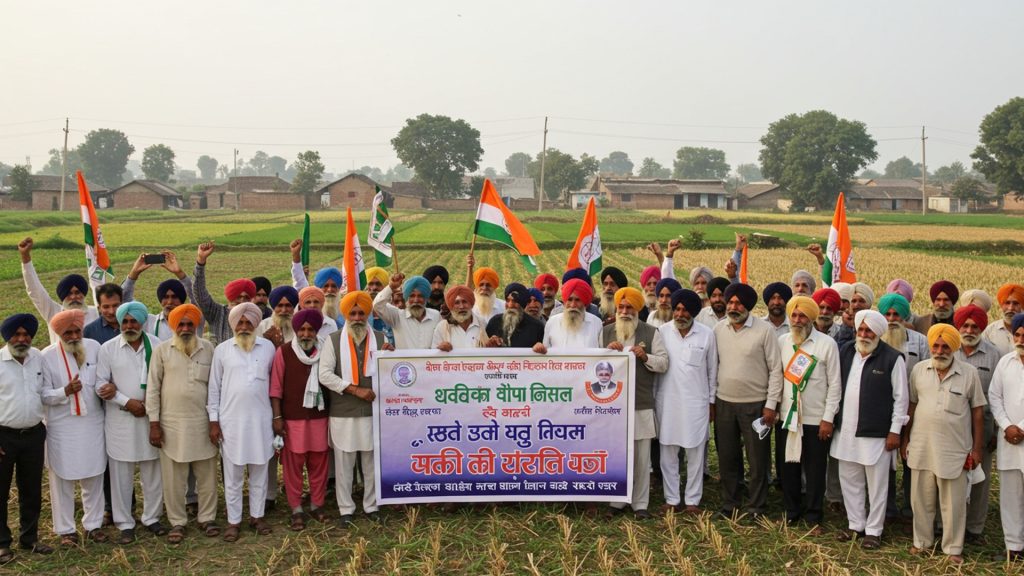After months of intense protests, farmers across Punjab celebrate a major win as the state government officially scraps its controversial land acquisition policy today. This landmark decision follows widespread opposition from farming communities who argued the previous rules unfairly allowed the government to take their land for big projects without proper payment or consent. The policy, which had sparked massive demonstrations and calls for its immediate end, threatened the livelihoods of countless families dependent on their ancestral farmlands. This move marks a significant victory for farmer groups, putting an end to a long-standing dispute that gripped the region and ensures better protection for agricultural land in the future.
Understanding the Policy
The Punjab government recently decided to withdraw the controversial Land Pooling Policy 2025, a move that followed widespread protests from farmers and strong objections from various groups. This policy, which was officially announced by the Aam Aadmi Party (AAP) government in Punjab, aimed to gather a large amount of agricultural land for new urban and industrial projects. The policy was first put into effect on May 14, 2025. then on June 4, 2025, with further changes made on July 25, 2025. The goal of the policy, as stated by the government, was to achieve “planned and sustainable development” across Punjab. It sought to acquire approximately 65,500 to 65,533 acres of land. The government stated that the policy would allow landowners to become “partners in the development of the state” by receiving a share of developed residential and commercial land. For example, a landowner offering one acre of land was to be given a 1,000 square yard residential plot and a 200 square yard commercial plot.
Why the Policy Caused Concern
Despite the government’s claims of it being farmer-friendly, the Land Pooling Policy 2025 quickly became a major point of conflict. A primary reason for the widespread opposition was the policy’s plan to acquire fertile agricultural land. Farmers worried that losing their productive land would directly impact their ability to earn a living. A significant flaw highlighted by critics was the absence of proper studies to assess the policy’s impact on society and the environment. The Punjab and Haryana High Court also noted that the policy lacked a clear plan for the rehabilitation of landless workers, artisans. other people who depended on the land but did not own it. This meant that while landowners might receive some benefits, those without land who worked on farms could be left without support. Another major concern was a clause in the policy (Clause 6 of the May 14 notification) that allowed for compulsory land acquisition under existing laws if land was not offered voluntarily. This made many farmers fear that their land could be taken against their will, even if the policy was presented as voluntary. Concerns about the policy’s transparency and accusations of it being a “land grab” scheme also grew among farmers and opposition parties. There were also worries based on past experiences, where under a similar policy from 2013, developed plots had not been given even after a decade in some cases. Many village councils also did not support the policy, with at least 115 passing resolutions to refuse offering land under the scheme.
“The court observed it was ‘prima facie… of the view that the policy appears to have been notified in haste’ without addressing key requirements such as Social Impact Assessment (SIA).”
Growing Farmer Protests
The concerns quickly turned into widespread protests across Punjab. Farmers, landowners. various political groups actively opposed the policy. Farmers held numerous demonstrations, including large motorcycle rallies in many parts of the state. In some districts, farmers put up “no entry” signs for leaders of the ruling Aam Aadmi Party, showing their strong disapproval. Only a small number of landowners, specifically 115, came forward to join the scheme since it was launched on June 2, even though it was meant to be open until September 30. The government initially defended the policy, with Chief Minister Bhagwant Mann stating that farmers “actually like the policy” and that it would make them partners in government development plans. To try and address farmer concerns, the government announced some changes to the policy on July 22. These changes included increasing the annual payment to landowners to Rs 1 lakh per acre until they received their developed plots, which was a five-fold increase from the earlier Rs 20,000. The government also made small farmers, even those with as little as one kanal of land, eligible for a residential plot. Landowners were also given the option to choose a larger residential plot instead of a commercial one.
Court Steps In, Policy Withdrawn
The mounting opposition and legal challenges ultimately led to the policy’s downfall. The Punjab and Haryana High Court issued an interim stay on the policy on August 7, 2025, pausing its implementation for four weeks. The court pointed out several legal and procedural problems, including the lack of environmental and social impact assessments, no clear timelines. no proper system for handling complaints. The court noted that the policy seemed to have been introduced “in haste.” Following the High Court’s decision and intense pressure from the protests, the Punjab government made the decision to withdraw the policy. Chief Minister Bhagwant Mann signed the withdrawal order on the evening of Monday, August 11, 2025. The Principal Secretary of the Department of Housing and Urban Development, Vikas Garg, issued a statement confirming that the “Land Pooling Policy dated 14. 5. 2025 and its subsequent amendments” were being withdrawn. The statement also confirmed that “all actions, like Letters of Intent issued, registrations done or any other action taken thereunder shall be reversed henceforth.” An AAP spokesperson, Neel Garg, explained the decision, stating that the policy was being withdrawn “respecting the voice of farmers” since they did not want it. The government is now expected to seek approval from the Cabinet for this withdrawal.
Reactions and Future Steps
The withdrawal of the Land Pooling Policy was widely seen as a significant victory for the farmers and a result of their strong and united protests. Senior farmer leader Jagmohan Singh of the Samyukta Kisan Morcha welcomed the government’s decision, suggesting that “good sense has prevailed.” He also mentioned that the policy was against the law as it did not follow the rules of the Right to Fair Compensation and Transparency in Land Acquisition, Rehabilitation and Resettlement Act, 2013. Political parties in the opposition, including the Shiromani Akali Dal, Congress. Bharatiya Janata Party (BJP), also praised the decision, calling it a win for the farmers and accusing the AAP government of attempting a “land grabbing scheme.” But, some farmer groups have stated that they will not stop their protests until a formal notification of the policy’s withdrawal is issued by the government. This shows that there is still some lack of trust between the farmers and the government regarding the matter. The Parliamentary Standing Committee on Agriculture, Animal Husbandry. Food Processing has also asked the Punjab Government to provide the official notification for the withdrawal of the policy.

